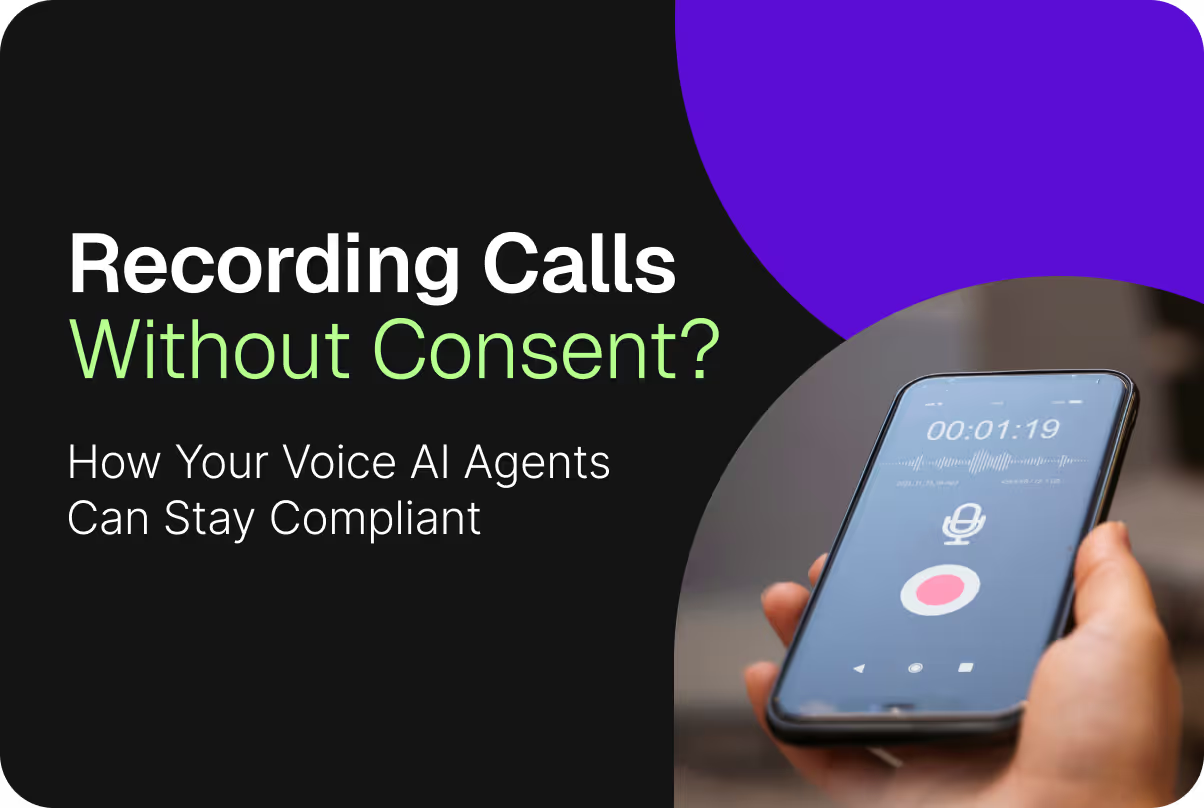Call recording is a standard practice in many U.S. businesses—used for training, compliance, dispute resolution, and increasingly, AI voice automation. But is it legal for a company to record calls without notifying the other party?
The answer depends on where your business is located, where your caller is located, and whether you disclose the recording. Call recording laws vary by state, and getting it wrong can expose companies to serious legal and financial risk.
This article breaks down U.S. phone call recording laws, including one-party vs. two-party consent, and explains how businesses—especially those using voice AI—can stay compliant.
Why Do Companies Record Phone Calls?
Phone call recordings help companies:
- Improve customer service and sales coaching
- Document verbal agreements and reduce liability
- Comply with industry regulations (e.g., HIPAA, PCI, GDPR)
- Train human agents and optimize AI-driven conversations
- Feed data into large language models for post-call automation
Recording can be a strategic advantage—but only if done legally.
One-Party vs. Two-Party Consent: What’s the Difference?
In the United States, call recording laws fall into two categories:
One-Party Consent (Federal and Most States)
Under federal law (18 U.S.C. § 2511), only one party involved in the call needs to consent to the recording. That means if your employee—or your AI voice agent—is part of the conversation, you don’t need to notify the other person.
Most states follow this one-party consent rule, including:
- New York
- Texas
- Illinois (with exceptions)
- Georgia
- Ohio
- Florida (for criminal cases; civil varies)
Two-Party (or All-Party) Consent States
Twelve U.S. states require consent from everyone on the call. In these states, companies must inform the caller that the conversation is being recorded. Failing to do so can lead to civil or criminal penalties.
Two-party consent states include:
- California
- Connecticut
- Florida (for civil calls)
- Maryland
- Massachusetts
- Michigan (uncertain—courts are divided)
- Montana
- Nevada
- New Hampshire
- Pennsylvania
- Washington
- Illinois (some cases)
If either the caller or the business is located in a two-party state, you must comply with the stricter law.
Can AI Voice Agents Record Calls Without Consent?
If you're using an AI voice agent, such as Synthflow, to handle inbound or outbound calls, the same legal standards apply:
- In one-party states, the AI agent itself counts as a participant, so no additional disclosure is required.
- In two-party states, you must play a recording disclaimer at the beginning of the call.
A common and legally accepted approach is to start every AI-handled call with a message like:
“This call may be recorded for quality and training purposes.”
This not only satisfies legal requirements but also builds transparency and trust with your customers.
Legal Risks of Recording Without Consent
Recording a phone call without proper consent—especially in a two-party state—can result in:
- Civil lawsuits and statutory damages
- Criminal prosecution in some jurisdictions
- Fines or class-action liability
- Suppression of evidence in legal disputes
- Reputational harm and compliance violations
That’s why many companies choose to disclose recording by default, even in one-party states.
Best Practices for Businesses
To remain legally compliant and operationally efficient, companies should:
- Always disclose call recording upfront, especially when dealing with consumers across state lines.
- Use consistent verbal notifications or audio prompts.
- Ensure all AI agents are configured to deliver legally compliant recording messages.
- Log consent automatically (especially important for regulated industries).
- Encrypt and securely store all call recordings in accordance with HIPAA, GDPR, or PCI-DSS if applicable.
- Train staff—and AI assistants—to handle objections or opt-outs.
- Consult with legal counsel, particularly when operating nationally or internationally.
What About International Calls?
If you're recording calls involving individuals outside the U.S., you'll need to comply with global privacy regulations, such as:
- GDPR (European Union)
- PIPEDA (Canada)
- PECR (United Kingdom)
These often require explicit, informed consent and clearly documented privacy policies. Synthflow supports localized disclaimers and recording settings to help customers meet international compliance standards.
Conclusion: Can a Company Record Calls Without Consent?
- In most U.S. states, yes—as long as one party consents.
- In 12 states, no—you need to notify all parties.
- If in doubt, always disclose.
- And if you use AI voice agents, make sure they’re set up to follow the rules.
Recording calls can improve service and reduce cost—but only if your compliance strategy is solid. Whether you're training staff, deploying AI agents, or capturing valuable data, ensure your setup respects both state and federal law.
Stay compliant while unlocking the value of recorded conversations. See how Synthflow helps enterprises manage call recording legally and securely. Book a demo today.
Disclaimer: This article is for informational purposes only and does not constitute legal advice. Consult a qualified attorney to evaluate your specific situation.






